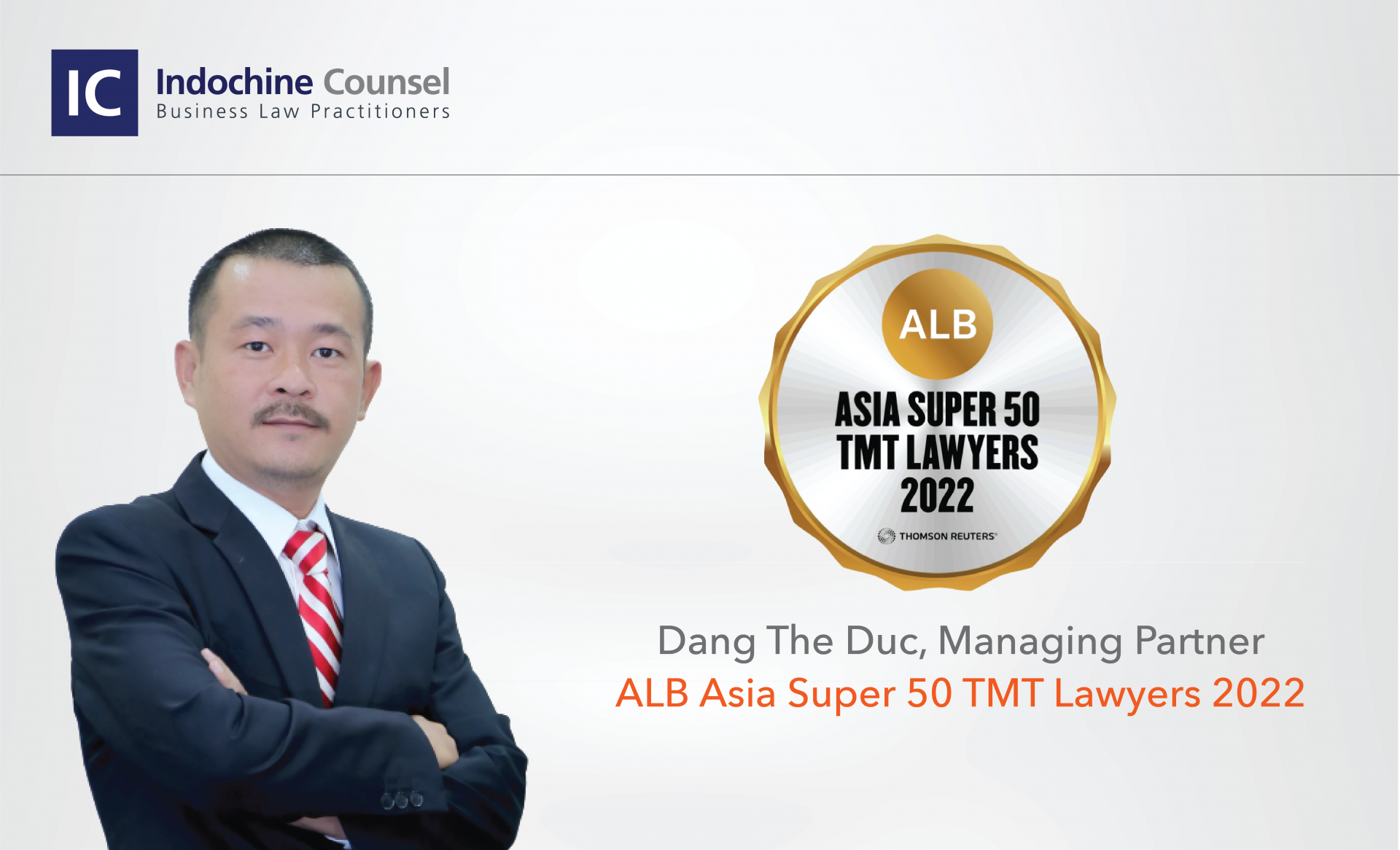Key developments for ID's at credit institutions
One of the cornerstones of improving corporate governance is the role of independent directors (IDs), who offer impartial oversight and strategic consultation to the board of directors.
Vietnamese law has provided a legal framework for IDs in various categories of companies, from non-public joint stock companies to public companies and CIs, the regulations for IDs vary among these types of companies.
Recently, the newly enacted 2024 Law on Credit Institutions (CI Law 2024) has brought significant updates to the regulations regarding IDs in CIs. Effective from July, these revisions are expected to elevate governance standards and bolster investor confidence.
 |
| Ngo Dang Loc, (left) associate, and Vu Pham Huyen My, legal assistant, Indochine Counsel |
CI Law 2024 mandates a substantial increase in the minimum number of IDs and the presence of non-executive directors, or directors who do not concurrently hold executive roles such as general directors/CEOs, chief accountant/CFOs, and branch heads, on the boards of CIs, particularly by increasing the minimum quantity of IDs from one to two members, and elevating the proportion of the aggregate number of IDs and non-executive directors on the board from one-half to two-thirds.
These modifications represent significant changes compared to previous regulations, and are expected to enhance oversight, diversify decision-making, and mitigate potential conflicts of interest. With the new quantity requirement, IDs may not feel so isolated on boards. Furthermore, since the total number of IDs and non-executive directors now exceeds the number of directors concurrently holding managerial roles, the influence of executives on the performance of the board will be substantially reduced.
The 2010 Law on Credit Institutions was the first legal document specifying requirements for IDs, which were subsequently adopted by law on enterprises and securities. While major requirements for IDs in the previous law remained, CI Law 2024 provides additional restrictions to ensure the independence of IDs. Specifically, IDs are now prohibited from holding executives positions of CIs where they serve as ID; or as managers and executives of other CIs; or as managers of more than two other enterprises; or as inspectors or members of inspection committees of other CIs and enterprises.
The new rules mark a significant advancement in ensuring independence for IDs. Individuals holding managerial, executive, or inspector roles at other CIs or enterprises are no longer qualified to become IDs of a particular CI.
This regulation could be prompted by a case involving Van Thinh Phat (VTPGroup), Saigon Joint Stock Commercial Bank (SCB), and Tan Viet Securities JSC (TVSI), which occurred during the development of CI Law 2024. According to local press reports, Nguyen Tien Thanh held roles as an ID of SCB while also being board chairman and general director of TVSI, while maintaining a close relationship with VTPGroup. TVSI and SCB jointly participated in a bond issuance scandal involving a number of companies, including An Dong Investment Group, an affiliate of VTPGroup. TVSI acted as a consultancy and issuance agent while SCB introduced bond products to its clients.
Moreover, the prosecution authority recently determined that Mr. Thanh, as a board member of SCB, participated in the preparation of credit dossiers, and reviewed and extended credits to companies under the VTPGroup, contravening bank policies and leading to the misappropriation of funds. This situation highlights how Thanh’s relationship with VTPGroup and his leadership roles in TVSI compromised his impartiality and objectivity as an ID for SCB.
Despite new commendable updates, significant shortcomings persist. While the increase in minimum IDs is laudable, concerns arise over the ratio of IDs within a board. CIs may increase the overall number of board members to dilute the influence of the IDs. That is the reason why some argue for a proportional approach, akin to enterprises and securities laws, rather than a fixed number.
Moreover, some may find the new criteria for the independence of IDs as mentioned above overly stringent, especially considering scenarios where no direct economic relationship exists between the CI where an individual may serve as an ID and other entities where the same individual may hold a leadership or inspector role.
Additionally, explicit delineation of IDs’ rights and obligations remains lacking. CI Law 2024 vaguely mandates that IDs must uphold their independence while executing their duties, yet fails to delineate specific authorities. Clarifying these aspects would empower IDs to fulfil their governance roles more effectively.
 | Positive scenarios for working capital development Security over receivables is mainly regulated by the Civil Code 2015 and Decree No.21/2021/ND-CP, as well the Law on Credit Institutions 2010, and its detailing and guiding Circular No. 02/2017/TT-NHNN promulgated by the State Bank of Vietnam (SBV). |
 | Conforming to treaty via Law on IP In the last few years, Vietnam has signed a certain number of international trade agreements which require Vietnam to accede to or approve the WIPO Copyright Treaty (WCT) within a prescribed time period. Partner Nguyen Thi Hong Anh and junior associate Vu Hoang Ha Thu of Indochine Counsel take a look at amendments and supplements made in the Law on Intellectual Property in June. |
 | Indochine Counsel's managing partner among ALB Asia Super 50 TMT Lawyers 2022 Managing partner Dang The Duc from Indochine Counsel is listed in the ALB Asia Super 50 TMT Lawyers 2022. |
 | Defining innovative startup enterprises in Vietnam The state has provided special policies to encourage small- and medium-sized startup enterprises (SMEs) that primarily focus on tech advancement and research, and need the assistance of all resources for building their reputation and market status. |
 | Indochine Counsel welcomes Nguyen Quoc Vinh Indochine Counsel is delighted to welcome Nguyen Quoc Vinh as Senior Counsel to its team. With more than 25 years of experience in both the public sector and international law firms, Vinh is an expert in mergers and acquisitions (M&A), finance, real estate, energy, hospitality, insurance, fintech, arbitration, and other corporate and commercial matters. |
What the stars mean:
★ Poor ★ ★ Promising ★★★ Good ★★★★ Very good ★★★★★ Exceptional
Related Contents
Latest News
More News
- From idea to market: fintech sandbox takes shape (May 16, 2025 | 09:46)
- Legal protections for local companies (May 08, 2025 | 10:39)
- Drawing insights from data law draft (March 27, 2025 | 15:00)
- Sandbox for crypto assets in Vietnam: if not now, when? (March 11, 2025 | 11:34)
- Securities law reflects alignment efforts (February 25, 2025 | 10:42)
- New law marks shift for electricity market (February 12, 2025 | 14:30)
- Indochine Counsel launches new corporate identity (September 23, 2024 | 06:52)
- Virtual assets in Vietnam: a regulatory outlook (January 04, 2024 | 17:11)
- Investors must be wary of the status of digital assets (June 12, 2023 | 12:13)
- Nuts and bolts of new personal data decree (May 09, 2023 | 15:00)

 Tag:
Tag:
























 Mobile Version
Mobile Version